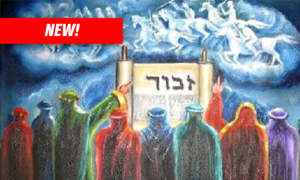This week’s lesson is dedicated by Levi & Rivkah Levitin in memory of their beloved grandmother, Miriam Weiss, of blessed memory. Yahrzeit, Rosh Chodesh Shevat.
Part 1 | Honor G-d’s People
In the first section of the Rebbe’s talk, he lays out the topic of the discussion: With the approach of the High Holidays, rabbis are preparing their sermons, and some prefer to rebuke and speak down to their congregants. This is not an appropriate Jewish behavior.
The sources which follow set the table for the continuation of the Rebbe’s talk. The Prophet Isaiah was punished for speaking negatively about the Jewish people. In fact, Torah is careful to use clean and positive language, as the Talmud learns from the verses about Noah’s ark. However, a distinction must be made when giving over matters of law.
In the second section of the Rebbe’s talk, he shares the story of Isaiah and points out how extreme the story really is: Isaiah had every reason to say what he did, and his conversation had practical implications, like a ruling of the Torah, and yet he was still punished.
Part 2 | A Lesson from the Prophet
In the third section of the Rebbe’s talk, the Rebbe explains that every person must learn a lesson from Isaiah. But moreover: Isaiah’s sin was totally out of character for him, and he sinned only to teach us this lesson—similar to what the Talmud says about King David’s sin with Batsheva.
In the sources which follow, we present the Talmud’s teachings about King David, to better understand the Rebbe’s statement that a sin could be only for the sake of the lesson to later generations.
Part 3 | Jerusalem’s Abominations
In the fourth section of the Rebbe’s talk, he relates a story about Rabbi Eliezer of the Talmud. When someone chose to read a Haftorah which painted the Jewish people in a negative light, Rabbi Eliezer said that his choice stemmed from a deeper problem—his own questionable lineage. This story reiterates the lesson—always speak in a positive manner.
Part 4 | How to Influence
In the fifth segment of the Rebbe’s talk, he focuses on the lesson: Speak only in positive terms. Inspire people by uplifting them, not by denigrating them. That is the most effective way to accomplish your goal.
Conclusion: How the Baal Shem Tov Inspired Simple Jews






